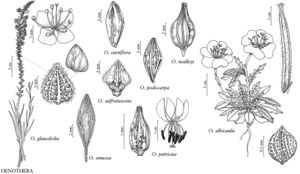Oenothera glaucifolia
Syst. Bot. Monogr. 83: 212. 2007.
Herbs probably biennial, glabrous, becoming sparsely to densely glandular puberulent and short-villous distally, glaucous at least in proximal parts; from stout roots. Stems erect, branched or unbranched, 30–300 cm. Leaves in a basal rosette and cauline, basal 3–7 × 0.5–2 cm, sessile, blade oblong to oblong-lanceolate, base usually ± auriculate, margins entire; cauline 3–8(–10) × 0.4–1.8 cm, blade lanceolate to oblong-lanceolate, gradually smaller, becoming linear-subulate distally. Inflorescences long, wandlike, unbranched or branched. Flowers 4-merous, nearly actinomorphic, opening near sunrise; floral tube 6–17 mm; sepals 4–6 mm; petals white, fading off-white or tinged pink, slightly unequal, rhombic, 4–6 mm, abruptly clawed; filaments 5–8 mm, anthers 1.5–2 mm, pollen 85–100% fertile; style 6–10, stigma exserted beyond anthers at anthesis. Capsules ovoid, 4-angled, somewhat flattened, 3–4 × 1.5–2.3 mm, valves with raised midrib and conspicuous lateral veins; sessile. Seeds 1, pale yellow, oblanceoloid, 2.4–2.6 × 1–1.5 mm. 2n = 14.
Phenology: Flowering May–Oct(–Nov).
Habitat: Rocky prairie slopes and outcrops or bluffs, along streams, roadsides, usuallyon limestone.
Elevation: 200–1300 m.
Distribution
Ark., Colo., Kans., Mo., Nebr., N.Mex., Okla., Tex., Wyo.
Discussion
Oenothera glaucifolia is self-incompatible, the flowers diurnal, pollinated primarily by wasps (R. Clinebell, unpubl.), as well as bees, flies, butterflies, and occasionally beetles (summarized by W. L. Wagner et al. 2007). It was collected once in 1988 in Indiana at Miller Woods Visitor Center (Lake County), Dritz 596 (MOR); it seems likely that it was introduced, and has not been collected there since.
Stenosiphon virgatus Spach is a superfluous name and pertains here.
Selected References
None.
